- Home
- Chris Pourteau
Gettysburg: A Tale of the Second War for Pennsylvanian Independence Page 2
Gettysburg: A Tale of the Second War for Pennsylvanian Independence Read online
Page 2
Precise laser strikes burned the plain behind Hatch. This was no lone soldier with a laser rifle. This was a dropship’s gunner, whose sole purpose was to hit what he was aiming at from a moving air vehicle. The lieutenant quickened his step. Bracer made it to the trees and dove past the 18-millimeter machine gun deployed by Bravo Squad. It peppered the sky.
“Aim that bloody thing higher!” bellowed Stug as he, too, pounded through the tall grass and past the thundering thrrrit-thrrrit-thrrrit of Bravo’s machine gun.
Hatch dove right, rolled, and popped upright again, the nausea all but gone. If he was lucky, between the threat of Bravo Squad and his own light feet, he might outmaneuver the dropship before it killed him.
The gravimetric servos keeping the enemy’s ship in the air whined closer, broken up by the screech of its laser cannon. The dropship gunner and Bravo Squad’s heavy-weapons man faced off like they were playing an old-fashioned game of chicken, each determined to force the other out of the firefight. Hatch saw the grass catch fire to his right as Hawkeye passed into the trees.
“Come on, officer, sir!” yelled Stug, his voice carrying incredibly over the mayhem. “I’m too old to have to train a new lou!”
Hatch ground his teeth, veering left. It was a mistake. His foot went deep into a smoking hole left by the tracking fire, and he stumbled jerkily, falling to his knees. As if hungry and aware of its prey’s vulnerability, the dropship intensified its laser fire, the heat of a blast slicing the back of Hatch’s leg. He collapsed forward, his face slamming into the charred dirt.
Distantly, he heard voices as time slowed down. Stug railing at Bravo Squad. Trick giving his troops orders. The almost calming flutter of the dropship engines. Slowly, painfully, he turned over onto his back. The first afternoon in July boasted the bluest sky he’d ever seen.
He heard a crack, a boom, and a long note warping up in scale, like a violin arcing upward from a low major to a high minor key. Then a Doppler shift in the pitch of the noise, and he knew the dropship was moving away from him. The laser fire had ceased. He turned his head and followed the Transport ship as it swooped back toward the town. Tracer fire from the 18-millimeter continued harassing the enemy ship as it limped away, still aloft but slowly descending.
Hands on him. Big hands.
“Now I have to sling you too?” whined the sergeant. For once, the gravelly, nasal voice sounded downright divine.
Hatch felt himself lifted like a five-pound sack of potatoes, then suddenly found he was looking at an upside-down canteen, two sonic grenades with their triggers pointing strangely upward, and the not insubstantial mass of Stug’s ass. That’s when he passed out.
Standing alone in the hastily erected field tent, the captain of Bestimmung Company—dubbed the QB by her soldiers—stared down at the hastily drawn map of the area. Normally, the Internet would’ve supplied any needed information via the BICE device, but they were under blackout conditions now. No unauthorized Internet traffic until further notice, lest the Authority tag an access attempt and run their location down like a hound treeing a possum.
That’s a phrase Poppa might’ve used.
The thought came unbidden, an unwanted echo from the past. Or at least, it felt unwanted. It always took a little time to get used to her inner voice again after shutting down the BICE. When the device was on, a channel of chatter buzzed in her head constantly, except during sleep. Someone was always asking for orders or giving them, discussions somewhere else required the QB’s attention, or she’d be on the Internet researching and planning. Or, more rarely, she’d simply be escaping all the order-giving, researching, and planning by doing a little mindless surfing. It was during those times she popped Q and, usually, slept in a stupor. Sometimes it was the only way she slept.
But now, in the cavernous silence of her own head, that inner voice—the one that cajoled, encouraged, scolded, challenged, and oo-rahed her—was loud and clear. She’d thought of the voice as her only friend when she was detained by Transport as a child. On the days when Gutierrez would question her, she’d simply disconnect from reality, ignore him, and her inner voice would tell her everything would be okay. It would play games with her, distract her from his fumbling attempts to extract her cooperation. He was new at his job then, not very efficient, and she had been very young.
Now when the voice spoke, it just reminded her of that time. And thus it was unwanted.
You don’t really believe that.
The QB jerked her head, as if she could knock the voice out of her ear and onto the floor. “I don’t have time for this right now,” she whispered.
Okay, that I’ll grant you.
The tent flap pushed inward. Trick, of Bravo Squad.
“Captain, Stug—er, Sergeant Miller—is waiting outside.”
She nodded, staring back at the map. Alpha Squad’s spotter, Hawkeye, had drawn it for her based on the GIS surveys he’d pulled up during their firefight.
“Send him in.”
Trick saluted and held the canvas flap aside for the lumbering Sergeant Miller. Stug, she reminded herself. The QB liked to encourage her soldiers’ familiar names for one another, even used them herself on occasion. It promoted unit cohesion, made them fight harder for one another, like shield brothers in Ancient Greece. TRACE needed every advantage it could get in this war. Lord knew they had enough working against them. The odd realization struck her that no nickname had ever really stuck for Hatch. He was just “Hatch” to everyone.
“That’ll be all, Lieutenant,” she said, nodding her head. “Thank you.”
As Bravo Squad’s leader exited the tent, Stug came to attention. Not easy for someone of his height in the tiny space. He looked a bit like Atlas, recently relieved of the Earth on his shoulders, but still a bit hunched over and stiff. The top of his bald head brushed the tent’s canvas.
“Sergeant,” she acknowledged.
“Captain. Ma’am. QB.” Stug winced at the slip.
Her inner voice smiled at his stuttering. It was rare for him to report to her; usually Hatch did. Clearly it made him uncomfortable.
And there it was again, her own familiar name among the troops. The QB. Her commanding officer had given it to her a long time ago. It supposedly referred to an old Earth sport, to the team leader, the quarterback, who called the plays on the field. She knew better. Once, when she’d come into conflict with the good colonel, he’d called her a princess, a Queen Bee. She’d taken some pride in that in the moment. Bucking authority was in her nature. It made her an original thinker, not always considered an asset by the military hierarchy. Later, she’d learned he’d meant Queen B. And the B wasn’t shorthand for a buzzing insect.
But instead of fighting it, she’d made it her own, even encouraged its use by not stamping it out. And anyway, it was better than the other name they had for her. Old Granny. At 37, she was the oldest company commander in TRACE.
“Give me your report, Stug,” she said, pushing past the memories.
The sergeant smiled at her use of his nickname. He actually stood up a little straighter, which only made him appear to be wearing the tent for a turban.
“Well, ma’am, we didn’t get any further than the outskirts of the town when we hit the guard post. One man pinned us in a ditch till we took him out.”
Succinct, to the point. Part of her liked the efficiency of it. Another part was frustrated by the lack of detail.
“Show me,” she said, nodding at the map.
Stug came around. “Here’s the ditch we were in. And here’s the post. Bravo Squad was in this tree line, covering us. The dropship came from the town proper,” he said, pointing to the map’s eastern edge.
The tent was small and the sergeant was large. He still smelled like battle. Sweaty and acrid, the heavy grit of weapons fire mixed with the sharp scorch of lasers. Ever since she was a child, men in uniform looming over her had filled her with fear. Even sometimes, like now, when the man was her subordinate and had no idea of the respon
se he was evoking in her.
And never will, promised her inner voice.
Nodding solemnly, she moved around to the other side of the table, as if getting a better position to consider the strategic situation.
“How many drones?”
Stug stared at the map, as if doing so might show him their number on the paper.
“Unknown. Hawk said they were coming, but once the dropship got hit, we were outta there. Never made contact.”
The QB factored that information into the battle assessment forming in her head.
“If we sent out our own drones to reconnoiter, maybe circle around the town, they could help us get a better picture,” offered Stug.
Isn’t that sweet? He’s trying to be helpful, her inner voice said.
You’re not, she responded.
“True. We could also lose the only advantage we have if they get shot down,” she said patiently. “We have no idea of the size of the force inside the town. There could be an entire Transport division there, waiting for us.”
There was silence for a moment. Stug shifted on his feet. His fold of turban tickled his dome.
“Do you have something to add, Sergeant?”
“Begging your pardon, ma’am.” He was slow to start. He hated arguing with an officer. But he hated the right answer going unspoken even more. “But we do know there’s not a division there.”
The QB raised an eyebrow.
“If there was a division there, we wouldn’t have made it back. We saw one man in a frontier guard post, one dropship with how many troops inside? Didn’t get a chance to find out. And a handful of drones that never actually made it to the battlefield.”
“Do go on.”
“My guess? A platoon, maybe less, widely dispersed around the town. If the enemy was there in force, one man alone wouldn’t have pinned us down for so long. They would’ve reinforced sooner. And they would’ve pressed the attack, not run for the hills because our gunner plinked one dropship’s engine.”
She looked down at the map again. “So what do you advise?”
Stug was flattered. He was used to being given an objective and told to take it with a handful of grunts. His opinion of strategy was not often asked.
“Our objectives are the warehouses, here and here,” he said, pointing to the south side of town. “The big warehouse, of course, where the okcy shipment is. But it’s insulated, protected by the squat, longer building to the south.”
She nodded. Their original plan had been to simply walk in and take the okcillium from the large, multi-story warehouse, load up as much as they could, and steal away again. Like bank robbers racing a countdown before the cops arrived. Only in this case, the money was a precious mineral.
“We go in from the south and take the shorter warehouse,” Stug said. “Stage the move on the taller one from there.”
The QB glanced at the dimming shaft of light coming through the tent flap.
“We’re almost out of daylight.”
“A night raid might be better,” the sergeant suggested.
She shook her head. “How would we see? They’ve proven they have jammers. We’d be fighting blind.”
Stug shrugged.
In truth, he’d just confirmed a strategy she might’ve come up with on her own after studying the map closer. Bold, risky, with the promise of great reward. But it would be more of an even fight by daylight.
“One other thing, Captain,” he said hesitantly.
“Yes?”
“We should send those drones out. Course them around the town’s perimeter. Map the interior. Bring us back the picture, load it up in the BICEs, set them to LAN access only. Keep them off the Internet. That way, at least, every soldier out there will have a tactically accurate situation to start with.”
She grunted. “To start with. What’s the old axiom from von Moltke? ‘No battle plan survives contact with the enemy.’”
Stug shrugged a second time. “Better than nothing.”
The captain smiled. “Ever practical, eh Stug?”
“Practical is my job.” He stood up a little straighter still. “I’m a sergeant, ma’am.”
The best I’ve got, she thought. “How’s your lieutenant?”
“Hatch? Oh, he’ll be fine,” scoffed Stug. “Just got a little sunburned.”
“Uh-huh. Can he walk?”
“As straight as he ever could,” the big man said playfully. He was being familiar now, a bold move with his lieutenant’s superior officer. She took it as a good sign of Hatch’s health, so she let it pass. “The laser singed his panties—um, trousers, ma’am—but the leg burn is superficial. I’m not even sure why he passed out, really.” He said this last in a teasing tone, one that promised Hatch wouldn’t live down having fainted anytime soon.
“Good to hear.” Nodding at the tent flap, she said, “You’re dismissed, Sergeant.”
Stug saluted and turned to go.
“Oh, and Sergeant?”
“Ma’am?”
“Send Trick back in.”
“Yes, ma’am.” He opened the tent flap, then halted, asking no one in particular, “When did it start to get dark?”
As he exited, the QB returned to the map. The short warehouse first. That would be the conduit to the second, larger storehouse it was connected to. They needed that okcillium. Badly. And if they could hold both buildings and the surrounding area long enough to load up the converted airships they were using to move the cargo, they’d have it.
She glanced over at her projectile-firing weapon. It had served TRACE well when no other option was available, but it was a relic to be sure. To compete with Transport, they needed better. They needed laser weaponry, and lots of it.
Or more to the point, they needed power. Manufacturing the laser weapons was easy—all you needed was a couple of 3-D printers. But you could print weapons all day and it would get you nowhere if you didn’t have the okcillium to power them. And that’s why these warehouses were so important.
There is an opportunity here, she thought.
Of course, even a warehouse full of okcillium wouldn’t completely level the playing field. She knew that. Transport had always had more resources, more dropships, more drones, more everything—and it always would. Only in the area of BICE technology—thanks to the SOMA and his technological prowess—had TRACE been able to keep pace.
No, they couldn’t match Transport’s resources. But with that much okcillium, and the weapons it could power . . . they could come close.
Yes.
Lieutenant Mason entered the tent. Before he even announced himself, she motioned at the map.
“Stug thinks we should go in. The sooner the better.”
The young lieutenant was silent for a moment.
“A bit blind, ma’am.”
She nodded. “That’s why I want you to send our drones out. Circumnavigate the town, stay to the woods and mountains as much as possible. I want a complete survey by morning.”
Trick opened his mouth, then thought better of it.
“Speak, Lieutenant. No time for egos here.”
He stared at the map. “We have half a dozen drones pieced together and programmed from how many skirmishes with Transport? A lot of TRACE soldiers died so we could patch those things together.”
She waited. She knew where he was going, but the argument needed to be made.
“We’re taking an awful risk sending them out without ground support,” Trick said. “If we lose them . . .”
The decision hung in the air for a moment.
“Our soldiers didn’t die to create six museum pieces,” the QB said patiently. “We have an asset. We need to use it.”
Trick stood up straight. “And if we lose them?”
The QB took her eyes off the map and brought them directly to his. “Then we’ll secure six more. We’re not fighting a war for the vid cameras, Lieutenant. We’re not saving dessert till after dinner. We’re using every asset we have to bring Transport d
own and secure freedom for all of us. Caution is one thing. I’m not advocating recklessness. We’ve been lucky in victory of late, but time is not on our side. Eventually Transport will wear us down. With manpower, with resources, with the power curve to put more of both in the field than we can. We’ve been at war for a generation. Both sides are weary. But we’re older, if you know what I mean.”
This was the most she’d ever explained herself to a subordinate. It was uncomfortable but necessary, she thought. The whole war could turn on this one battle.
Trick stood up straighter. “Yes, ma’am.”
She acknowledged his acceptance with a curt nod.
“Ma’am, one more thing.”
“Yes?”
“Have you run this past Colonel Neville?”
She looked at him sharply.
His brows rose in defense. “I don’t mean that the way it sounded. I mean—”
“You mean have I covered my ass?”
A bit sheepishly, he said, “Yes, ma’am.”
She considered it, then, “No. Best to ask forgiveness on this one, not permission.”
Trick exhaled. “Fortune favors the foolish, ma’am?”
“We’d best pray that’s the case,” she said. “Tonight, Lieutenant, by the book. Set pickets, two-man squads. Keep them inside the Umbrella. Send out the drones in pairs to recon the town’s perimeter, two minutes apart. Close enough to reinforce should they encounter the enemy, but far enough from the other pairs so they can’t all be taken out at once.”
The lieutenant saluted. “Umbrella perimeter?”
“Keep it tight,” she said. “Focused.”
Powered by stored solar energy, the undetectable energy barrier that TRACE called “the Umbrella” would degrade quickly if too widely cast, but if focused in a tight dome, it would prevent any heat scans thrown their way from returning a signal. If the Umbrella did its job, a passing drone would only see one more area devoid of heat sigs. As long as the drone didn’t come into visual range, it would never know they were there.

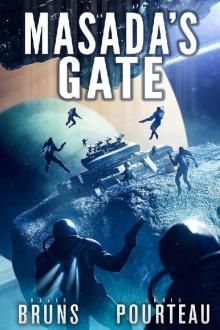 Masada's Gate
Masada's Gate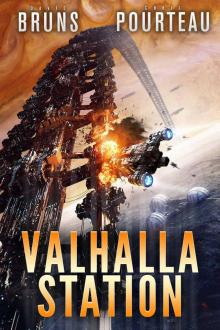 Valhalla Station
Valhalla Station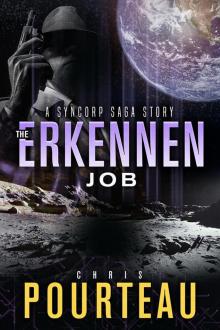 The Erkennen Job
The Erkennen Job Susquehanna
Susquehanna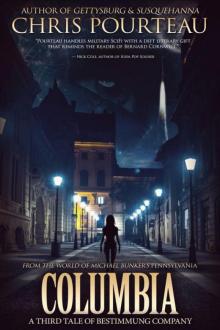 Columbia
Columbia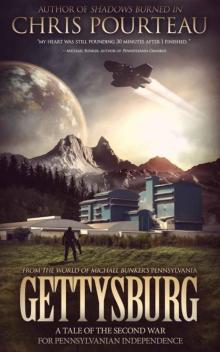 Gettysburg: A Tale of the Second War for Pennsylvanian Independence
Gettysburg: A Tale of the Second War for Pennsylvanian Independence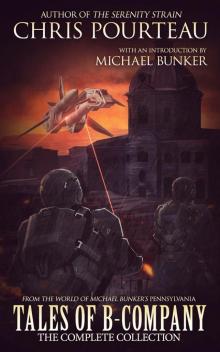 Tales of B-Company: The Complete Collection
Tales of B-Company: The Complete Collection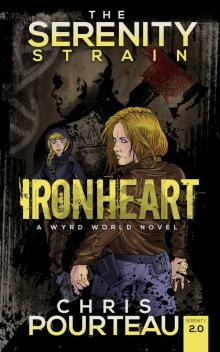 Ironheart (The Serenity Strain Book 2)
Ironheart (The Serenity Strain Book 2)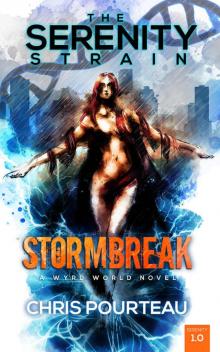 Stormbreak (The Serenity Strain Book 1)
Stormbreak (The Serenity Strain Book 1)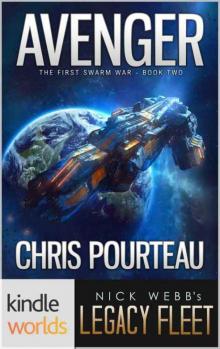 Legacy Fleet: Avenger (Kindle Worlds) (The First Swarm War Book 2)
Legacy Fleet: Avenger (Kindle Worlds) (The First Swarm War Book 2) Shadows Burned In
Shadows Burned In